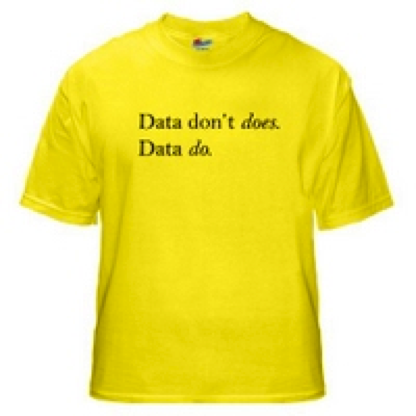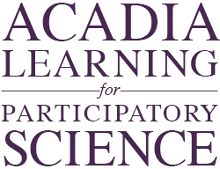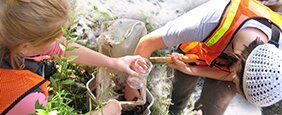Background for Teachers
Presenting research at a poster session requires not only a poster presentation, but an oral presentation as well. The goal of making an oral presentation is to quickly summarize the research and allow others to ask questions of the student research team. Students should be thinking about the ‘plain English take home message’ – the most important finding of their work – and be sure it’s clear to the audience. Encourage students to think of the presentation as teaching other people about what they’ve learned now that they are the experts in this particular research topic.
The following oral presentation guide is available as a printable pdf sheet for students.
Helpful guidelines for making oral presentations
Preparing for the presentation
Know the subject.
- You already know what you studied and what results were obtained.
- Identify the topic. What is the information you want to tell others about your work?
- Know how much time you have to speak; how many others from your team will be speaking and how much time will they need?
- Know who your audience is.
- Identify the material to be presented. Much of the presentation can be taken from the poster that your team has prepared.
Determine the main points of the presentation/construct your argument.
- Write a short single sentence about the main topic—you may want to include your hypothesis.
- Identify no more than 3-5 sub-topics that support your main topic-such as a brief description of the materials and methods used, and a description of the results—what the data showed, what they mean, and whether or not your hypothesis was supported. (Remember, there is no right or wrong answer. The hypothesis is either supported or not supported.)
- Make an outline of the presentation.
- Use note cards with key words, not whole sentences, to trigger your memory, and use them to refer to during your presentation. Don’t forget to number the cards in case they get mixed up.
- Use one card for the introduction (includes your main statement and such information as why mercury is important and why you chose the question you were trying to answer).
- Use one or two cards for each sub-topic.
- Use one card for the conclusion. (The conclusion summarizes the main idea and the major points.)
Practice. Practice. Practice.
Read your speech out loud several times to hear how it will sound to your audience.
Practice giving your speech in front of a mirror, some of your friends or your class.
Giving the speech
- You are the expert. It is your research so you know the material better than anyone.
- When you are giving your speech stay calm and smile. Remember to slow your speech down—don’t rush through the words.
- Make sure to enunciate clearly and don't slur your words.
- Speak a little louder than you would in normal conversation.
- Speak loud enough so that the entire audience can easily hear you.
- Make eye contact with the audience-if you can’t do that, at least look at something just above their heads.
- Ask if there are any questions.
- Humor is always a plus (but be professional)!
Goals
Students understand:
- That presenting research can occur visually or orally, but is best if the two mechanisms complement each other
Outcomes
- Students present their research in poster session-style
Where does this lesson happen in the Project?
This is the penultimate lesson to the project (or ultimate if there is no time for reflection afterward).
Getting Ready
Your students will have gotten their posters back from being printed.
They should become familiar with the peer review sheets.
Practice. Practice, Practice
Materials
- Posters
- Peer review sheets
- Pencils
- Clipboards
Student Prerequisites
- Students must have a research poster to present
Time Needed
One class period
Doing the Activity
This is variable depending on the format that you have chosen for your students to present their research. Students should set up their poster, be prepared to discuss their research and take time to review the posters of other researchers.
Assessment
Formative
Listen as your students practice their presentation, ask them "stumping" or out-of-left-field questions.
Summary
The posters prepared by the students will serve as the basis of the Unit 6 assessment. An important aspect of presenting information is the ability to receive and use feedback as well as to be a critical consumer of presentations in various forms. The assessment for Unit 6 asks the student to conduct a critical review of a few of the posters, and then has the student reflect on suggested changes to their own poster.
Each student should review two to three posters generated by other students and provide feedback using the Poster Presentations Reviewer Form (for the oral presentation) and the Poster Review Scorecard (poster itself). Both are provided as printable sheets. The feedback that students receive, in turn, should be the foundation of a reflective piece, written by the students, on what they could change to clarify or improve their own posters. Students are assessing the work of each other and in turn being assessed on their ability to be discriminating producers and consumers of graphic information.
By reviewing other posters, the students have the opportunity to critique the quality of information they are receiving. The researchers who have created the posters receive feedback to improve or clarify the research story that they are trying to tell. By reading posters the students will develop a feel for posters that tell a concise story and also those that need improvement.
Process
Students will:
- Review posters using the Poster Presentations Reviewer Form and the Poster Review Scorecard
- Complete the Form and Scorecard for each poster reviewed
- Hand in their reviews to their instructors.
Instructors may use the Peer Critique Rubric (also provided as a printable sheet) to determine whether the reviewers provided an appropriate peer critique.
Instructors will forward the reviews to the presenters.
Students will reflect on their posters and the reviewers’ comments.
Lesson Extensions and Supplements
Constructive criticism is an important skill in science and in many other fields. Here are two enrichment activities that build on the poster critique. One is a critique of the student’s own poster, and one is a creative version of a peer review – proposing changes to another student’s poster. It’s important to reinforce the constructive – not negative or judgmental – nature of scientific criticism in these activities.
Self-critique
Now that you have presented your poster and received feedback from poster reviewers please answer the following:
- When you get the opportunity to present a poster about your research again what would you keep just the way it is about your poster and presentation? Why?
- What change or changes would you make to your poster and presentation? Why?
Rethinking a colleague’s poster
Complete a rough draft of a poster that you would create for one of the posters that you viewed, concentrating on improving the clarity of the poster and the research done.
Lesson Resources
All documents are download-able. Please contact Acadia Learning project staff if you would like them in a format that allows you to customized them for your classroom.
Guide to Oral Presentations
Poster Presentations Reviewer Form
Poster Review Scorecard
For Teacher's Use: Peer Critique Rubric
Remember:


 Acadia Learning brings scientists, teachers, and students together in partnerships that result in useful research and effective science education.
Acadia Learning brings scientists, teachers, and students together in partnerships that result in useful research and effective science education.